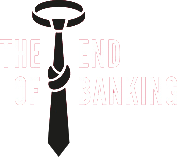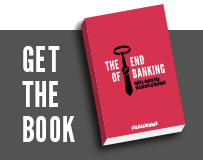About the Book
Check out our new book: Capitalism and the Market Economy
___
What people said about our first book The End of Banking:
«An interesting and challenging vision» (Vítor Constâncio, Vice-President of the European Central Bank)
«An absolutely new perspective» (Izabella Kaminska, Financial Times Alphaville)
«Thought provoking, bold, and visionary» (Barry Silverstein, Foreword Reviews)
«An important book about finance» (Dominic Elliott, Reuters Breakingviews)
«Deserves a bigger platform» (Dan Tudball, The Willmott Magazine)
«Well researched, stimulating, thought-provoking» (Manuel Stagars, CFA Institute Blog)
«Offers much to consider» (Publishers Weekly)
«A great contribution» (Sepp Hasslberger, P2P-Foundation)
«A trailblazing book» (Ryan Weeks, AltFi)
«The End of Banking is easily the ‘deepest’ examination of our financial system in a generation. The authors make crystal clear that it is only because we outsource money-issuance – a state function – to private institutions called ‘banks’ that money and credit fuse into one thing in contemporary economies.»
Robert C. Hockett, Edward Cornell Professor of Law
«Since policymakers are unwilling or unable to control our reckless financial system, rethinking the legal and economic foundations of banking is worthwhile. This thought-provoking book makes radical proposals that strike at the source of fragility in banking and which should be considered seriously.»
Anat R. Admati, Professor of Finance and Economics, Graduate School of Business, Stanford, and coauthor of The Bankers’ New Clothes: What’s Wrong with Banking and What to Do about It
«A fascinating analysis of the central role of money creation and shadow banking in the financial crisis. And a thought-provoking vision for more stable financial markets in the digital age.»
Alexander Barkawi, Founder and Director of the Council on Economic Policies
«I recommend The End of Banking for three reasons. First, the authors understand how the digital revolution is changing money, credit and banking. Second, the authors attempt to tackle monetary problems at the fundamental level of accounting. Third, the authors use simple and clear language.»
Martijn Jeroen van der Linden, Professor of New Finance at The Hague University of Applied Sciences
«This brilliant book explains, in simple and eloquent terms, how traditional banking really works, and what’s fundamentally wrong. A must-read for anyone interested in the future of finance.»
Emmanuel Marot, Founder and former CEO of LendingRobot
«Not content with their brillant, cogent analyses of the failings of incumbent, legacy finance and the excesses of private money-creation, the authors propose fundamental 21st century reforms. I hope Akerlof, Shiller, Stiglitz, Romer, Rob Johnson and other financial reformers will heed these and promote them.»
Hazel Henderson, founder of Ethical Markets Media
«McMillan wants an end to our current, toxic financial system which allows banks to create loans and deposits (money) by simply writing up both sides of the balance sheet. This system diverts seignorage to banks from cash strapped governments and increasingly encourages “boom-bust” financial crises. Worse, policy measures in response increase moral hazard and regulatory evasion in a never-ending and dangerous dynamic. In this book, McMillan embraces the digital revolution and shows, clearly and compellingly, how it can be used to create a financial system that is much better, much simpler and much fairer. Read it urgently and dare to think big.»
Convinced? Then get your copy now!
What is it about?
The End of Banking explains why a financial system without banking is both desirable and possible in the digital age.
- The first part of the book presents the functions and the mechanics of traditional banking. It discusses how a delicate balance of government guarantees and banking regulation kept the flaws of banking under control in the industrial age.
- The second part explains how the digital revolution unsettled this balance. The rise of shadow banking is explained, and it is shown how an unsustainable boom in the shadow banking sector led to a banking panic: the financial crisis of 2007-08.
- The third part shows that the digital revolution has played a dual role. Information technology not only undermined the effectiveness of current banking regulation, but it also rendered banking redundant. An innovative blueprint for a modern financial system is presented and the implications of the end of banking are discussed.
Why should I read it?
The End of Banking distinguishes itself from other books about the financial crisis of 2007–08 in several ways.
- First, it reveals the fundamental financial techniques that are common to all forms of banking—whether it is performed by medieval goldsmiths or by today’s managers at investment banks.
- Second, it offers a lucid and accessible account of shadow banking that will enlighten many readers.
- Third, and most importantly, The End of Banking does not rehash the same old regulatory patches or radical reform proposals from the past. Instead, it elaborates a new and intuitive idea of how to adapt the financial system to the digital age.
Table of contents
List of Illustrations
List of Acronyms
Preface
Introduction
PART ONE – BANKING IN THE INDUSTRIAL AGE
1. The Need for Banking
2. The Mechanics of Traditional Banking
3. The Problems with Banking
PART TWO – BANKING IN THE DIGITAL AGE
4. Banking Is Not Limited to Banks
5. The Mechanics of Shadow Banking
6. The Financial Crisis of 2007–08
7. The Financial System after 2008
PART THREE – A FINANCIAL SYSTEM FOR THE DIGITAL AGE
8. Banking Is No Longer Needed
9. Accounting for the Future: End Banking
10. The Role of the Public Sector
11. The Big Picture
Conclusion
References
About the Author
Index




